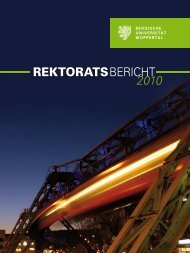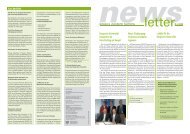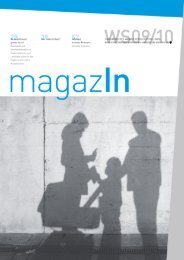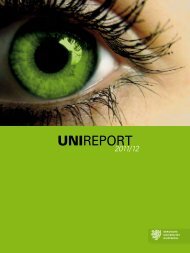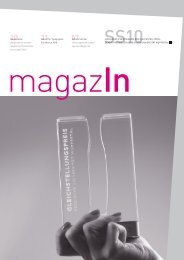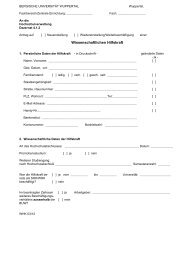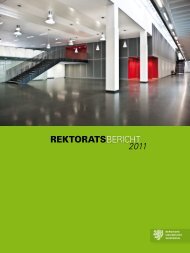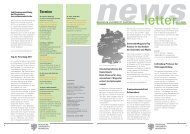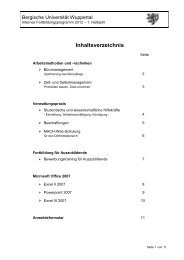international - Bergische Universität Wuppertal
international - Bergische Universität Wuppertal
international - Bergische Universität Wuppertal
You also want an ePaper? Increase the reach of your titles
YUMPU automatically turns print PDFs into web optimized ePapers that Google loves.
104<br />
hoW are things in zambia?<br />
eduCAtion in A<br />
GLobAL Context<br />
‘Living and learning in Zam-<br />
bia’ is the title of a project<br />
dedicated to the examination<br />
of Zambian education. What<br />
challenges and opportunities<br />
does it present for teachers<br />
and students? What factors<br />
determine the success or failure<br />
of education in a developing<br />
country like Zambia?<br />
Since 2008 Prof. Dr. Maria<br />
Anna Kreienbaum and Dr. Katja<br />
Gramelt from UW’s School<br />
of Education (Faculty of Educational<br />
and Social Sciences)<br />
have held seminars on these<br />
and related topics. Their goal<br />
is to introduce a global context<br />
of education and cultural<br />
encounter into the teaching<br />
program. As well as constituting<br />
a focal point of their own<br />
research, the project provides<br />
students with active research<br />
experience.<br />
14 dAys in AnotHer<br />
WorLd<br />
The project confronts stu-<br />
dents with everyday life in<br />
Zambia, as well as with the<br />
structure of Zambian education<br />
and its practical issues<br />
and problems. Supported by<br />
grants from the Society of<br />
Friends and Benefactors of<br />
the University of <strong>Wuppertal</strong>,<br />
the Faculty of Humanities<br />
Student Committee, and the<br />
German Protestant overseas<br />
Development Service (among<br />
others), seven UW students<br />
spent two weeks doing field<br />
research on the project. The<br />
group visited village and municipal<br />
schools in Zambia,<br />
as well as single sex boarding<br />
schools, coeducational<br />
schools, and schools with<br />
special needs sections, and<br />
was invited to the University<br />
of Zambia, the David Livingstone<br />
College of Education,<br />
and UNICEF. The program<br />
was completed by visits to<br />
other social and public institutions<br />
including hospitals,<br />
community centers, church<br />
groups, and aid organizations.<br />
interCuLturAL CoM-<br />
PetenCe tHrouGH<br />
PersonAL exPerienCe<br />
For future teachers it was<br />
a unique experience to en-<br />
counter the educational sys-<br />
tem of a developing country<br />
like Zambia at first hand. It<br />
deepened their sensibility for<br />
the educational challenges<br />
facing Africa, and gave them<br />
a new perspective on European<br />
and German systems of<br />
education. All those who took<br />
part in the visit agreed that it<br />
was an enriching experience<br />
to venture beyond Europe<br />
and the university framework<br />
and look at the practical application<br />
of what they had<br />
learned. For the students the<br />
trip represented a major step<br />
toward intercultural competence<br />
– an aspect of key importance<br />
for their future profession.<br />
MotiVAtion For<br />
FurtHer reseArCH<br />
A number of students from<br />
the Zambia project have written<br />
their examination theses<br />
in this area, for example on<br />
the Zambian educational system,<br />
the (increasingly questioned)<br />
effectiveness of external<br />
development aid, and<br />
the role of sports within the<br />
framework of social development<br />
measures. Excerpts are<br />
to be published in a volume<br />
of essays with contributions<br />
from German and Zambian<br />
authors. The project area<br />
has, to date, been little researched,<br />
and participants<br />
are in dialogue with other academics<br />
working in this field<br />
with a view to establishing an<br />
interdisciplinary network for<br />
exchange of information and<br />
the fostering of research into<br />
Zambia, its people and the<br />
social and educational challenges<br />
it faces.<br />
Living and learning<br />
in Zambia project<br />
k www.sambia.<br />
uni-wuppertal.de<br />
Prof. Dr. Maria Anna<br />
Kreienbaum<br />
University of <strong>Wuppertal</strong><br />
Faculty of Educational<br />
and Social Sciences<br />
Department of School<br />
Theory and General Didactics<br />
Gauss Str. 20<br />
42119 <strong>Wuppertal</strong><br />
Tel. +49 (0)202 439-3328<br />
E-mail kreienbaum@<br />
uni-wuppertal.de<br />
k www.theorie-schule.<br />
uni-wuppertal.de/<br />
105<br />
05_UW_INTERNATIoNAL




